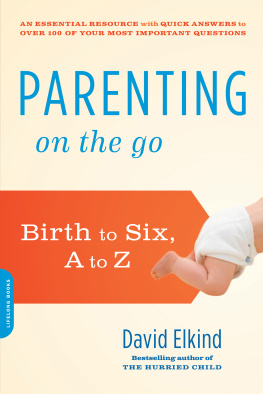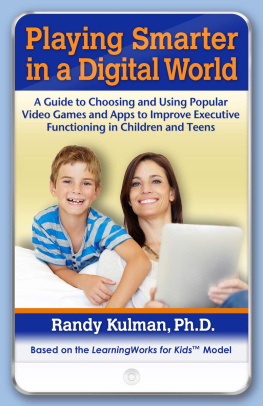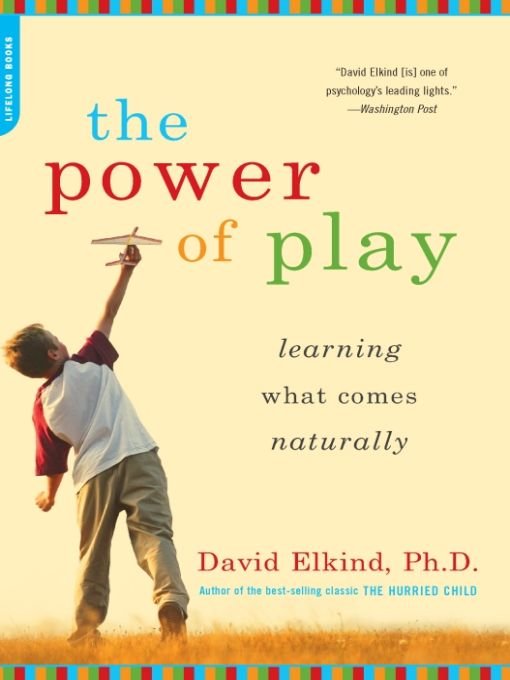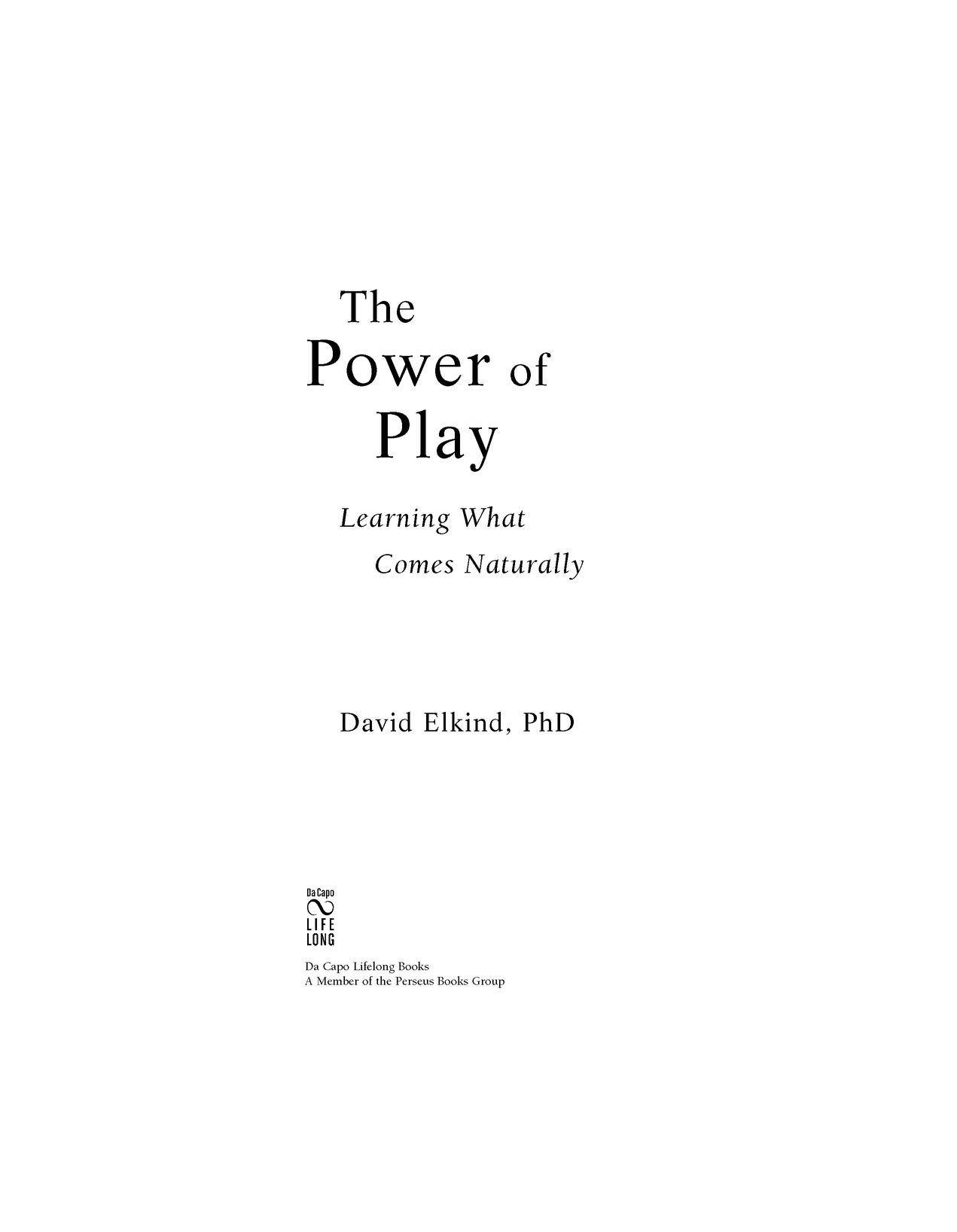Table of Contents
Praise for The Power of Play
In an era of consumerism and parental pressure, Dr. Elkind defends that most wonderful aspect of childhoodour childrens chance to dream and to make this a wonderful world for them and for us.
T. Berry Brazelton, M.D.
Elkind argues that... when we take away time from playful learning, we deprive kids of important opportunities for emotional, intellectual, and moral growth.
Teacher Magazine
Every parent should read this book... [Elkind] makes a coherent, readable, and altogether fascinating case.
John Rosemond
Dr. Elkind suggests fun ways to get kids thinking (that dont involve homework and books).
Womans Day
[A] fascinating look at the importance of letting kids be kids.... With clarity and insight, Elkind calls for society to bring back long recesses, encourage imagination, and let children develop their minds at a natural pace.
Publishers Weekly (starred review)
Drawing on diverse sources... [The Power of Play] is full of helpful discussions and examples.
Choice
The Power of Play should be considered one of the primers for good parenting.
Chicago Parent
Should be required reading for every parent.... Elkinds thorough research and carefully reasoned presentation serve to emphasize the importance and good sense of what he has to say.
Provo Daily Herald
One last shot at convincing American society about the dangers of the disappearing childhood.
Tampa Tribune
Elkind, one of todays leading psychologists, shows that it is through play that learning happens. He provides guidance for wise use of kids screen time, developmental understanding, and most interestingly, the use of good humor in parenting.
Nashville Parent
A timely book on the importance of unstructured play in the academic preparation and development of children.... Highly recommended.
Library Journal (starred review)
Reassuring... Dr. Elkind talks about how to reintroduce creative, imaginative play into your childs life.
Scholastic Parent and Child
Also by David Elkind
Children and Adolescents
The Childs Reality: Three Developmental Themes
The Child and Society
Child Development and Education
A Sympathetic Understanding of the Child
Understanding Your Child: Birth to Sixteen
Grandparenting: Understanding Todays Children
The Hurried Child
All Grown Up and No Place to Go
Miseducation
Ties That Stress
Images of the Young Child
Parenting Your Teenager
Reinventing Childhood
To my granddaughters
Lily, Heather, and freshly minted Maya,
and to the latest generation of nieces and great nieces,
Hallie, StellaBlue, and Raven,
for the fresh joy and excitement they have brought into our
lives and for reinforcing my belief in the power of play.
Introduction
Childrens playtheir inborn disposition for learning, curiosity, imagination, and fantasyis being silenced in the high-tech, commercialized world we have created. Toys, about which children once spun elaborate personal fables, now engender little more than habits of passive consumerism. The spontaneous pickup games that once filled neighborhoods have largely been replaced by organized team sports and computer games. Television sitcoms and movie CDs have all but eliminated the self-initiated dramatic play that once mimicked (and mocked) the adult world. Parents, anxious for their children to succeed in an increasingly competitive global economy, regard play as a luxury that the contemporary child cannot afford.
Over the past two decades, children have lost twelve hours of free time a week, including eight hours of unstructured play and outdoor activities. In contrast, the amount of time children spend in organized sports has doubled, and the number of minutes children devote to passive spectator leisure, not counting television but including sports viewing, has increased fivefold from thirty minutes to over three hours. The disappearance of play from the lives of our children is mirrored in the media. Television programs rarely depict children as simply playing and having a good time. More often they are portrayed as high-achieving miniadults or as preoccupied with school issues or family problems such as divorce, substance abuse, AIDS, and job loss. Even the cartoons have changed. Fred Flintstone and George Jetson never let work get in the way of having fun. Bob the Builder and SpongeBob SquarePants, on the other hand, love their jobs. SpongeBob was even named Employee of the Month at the fast food restaurant where he works. When did life for a child get to be so hard?
The health consequences for children resulting from the disappearance of play are already apparent. At the first ever Surgeon Generals Conference on Childrens Mental Health in 2000, it was reported that growing numbers of children are suffering needlessly because their emotional, behavioral and developmental needs are not being met by the very institutions that were explicitly created to take care of them. Over 20 percent of the child population now suffers from these problems. Moreover, the surgeon general also suggests that two-thirds of the children in this country suffer at least one health problem. Thirteen percent of our children are obese. We have more than 2 million children on Ritalin and other ADHD (Attention Deficit Hyperactivity Disorder) medications. This may be the first generation of American children who are less healthy than their parents.
The psychological consequences of the failure to engage in spontaneous, self-initiated play are equally serious and equally worrisome. Because children are spending so much time in front of television, as well as other screens, there is little time for exercising their predisposition for fantasy, imagination, and creativitythe mental tools required for success in higher-level math and science. The failure to develop these tools is, in part at least, one of the reasons America is falling behind other countries in attracting young people into these fields. For example, enrollment in U.S. science and engineering graduate education peaked in 1993, declined through 1998, and rose to a near record level by 2001. Graduate enrollment in engineering and computer science drove the recent growth, mostly because of foreign students. Enrollment in most other science fields remained level or declined.
Our schools are now contributing to the suppression of curiosity, imagination, and fantasy. Growing numbers of elementary schools are eliminating recess in favor of more time for academics. Our increasingly test-driven curricula have all but eliminated creative and playful teaching practices. Increasingly, rote learning methods are used to prepare children for the all too frequent assessments. Brazilian educator Paulo Freire wrote that education either liberates or domesticates. Colonial powers once used rote learning methods to domesticate indigenous peoples and induce obedience to external authority. Rote learning is anathema to critical, innovative thinking.






